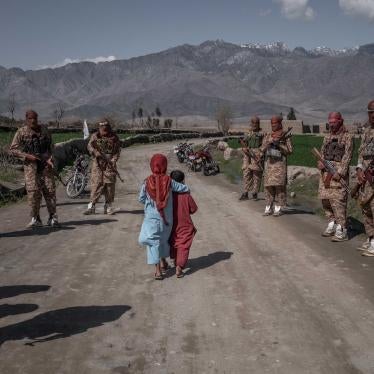Earlier this year, the Taliban gunned down a former fighter named Wasil Ahmad outside his home in Afghanistan’s Uruzgan province. The killers apparently targeted Wasil because he fought with a government-supported militia, the Afghan Local Police. Wasil’s death may have gone unnoticed, except that he was only 10 years old.
In Afghanistan, where both Taliban and government-backed forces use child soldiers, child recruitment more than doubled in 2015 from the previous year, according to a recent United Nations report. Child recruitment has skyrocketed in other countries as well. After the conflict in Yemen escalated in March 2015, children recruited by warring factions increased five-fold, according to the UN. In South Sudan, government forces and armed groups recruited as many as 15,000 children as soldiers in 2014 and 2015, abducting many by force.
These are not isolated cases. On Thursday, the State Department published its annual list of governments that are implicated in the use of child soldiers, including Burma, the Democratic Republic of Congo, Iraq, Nigeria, Rwanda, Somalia, South Sudan, Sudan, Syria, and Yemen. The report is the federal government's most comprehensive breakdown of which countries have reduced their use of child soldiers—and which have gotten worse. For example, Chad was taken off the list in 2014 after the government largely ended its use of child soldiers. But most countries on the list have used child soldiers for years. Nigeria was added to the list last year, and this year, Iraq appears for the first time, due to child recruitment by the Popular Mobilization Forces, a government-recognized paramilitary force under the prime minister’s command.
The United States has a powerful tool to pressure foreign countries to crack down on these abuses. But so far during his presidency, President Barack Obama has failed to use it effectively. By the end of September, Obama will have one final chance to address this alarming trend and demonstrate that the U.S. will not stand idly by while countries exploit children.
Under a landmark law adopted in 2008, the Child Soldiers Prevention Act, the U.S. prohibits giving certain categories of U.S. military training and assistance to countries that use child soldiers in their official armed forces or support paramilitaries or militias that do. The law sends foreign governments a powerful message: if you want U.S. military aid, you need to stop recruiting children.
Afghanistan, which gets billions of dollars in U.S. military aid each year, is conspicuously absent from the list of offenders, despite clear evidence that Afghan Local Police units, like 10-year-old Wasil’s, use child soldiers for military operations that are paid for in large part by U.S. military funding. To exempt Afghanistan from military sanctions, State Department lawyers have implausibly argued that the units fall in a gray zone between the Afghan armed forces and government-supported non-state militias and therefore are not covered by the law.
Too often, even countries included on the list get a free pass. In more than three-quarters of the cases where the law’s sanctions could be applied, President Obama has used his presidential authority to waive military sanctions for listed governments, in the name of “national interest.” As a result, countries like Somalia, South Sudan, and Yemen have received hundreds of millions of dollars in U.S. military assistance, despite continued—and even escalating—use of child soldiers.
In a handful of cases, the Obama administration has used the law to dramatic positive effect. One example is the Democratic Republic of Congo, where at the height of the country’s conflict, an estimated 30,000 children fought on all sides. In 2012, the Obama administration announced that it was withholding military training and foreign military financing from Congo because of its continued use of child soldiers. The UN had tried—and failed—for seven years to get the Congolese government to sign an action plan to end its child recruitment. But only five days after the US announcement, Congo signed the plan. In 2014, the UN documented only two cases of child recruitment by Congo’s national army—a huge decrease—and illustration of the law’s enormous potential.
Similarly, in 2013, the U.S. withheld foreign military financing and military training from Rwanda because of its support for the M23, an armed group that forcibly recruited large numbers of children as soldiers and brutally abused civilians in eastern Congo. Only a few weeks later, the M23 surrendered and laid down its weapons. Although part of the M23’s defeat was due to UN-backed Congolese military operations, mounting pressure on Rwanda to stop supporting the M23 played a crucial role
Rwanda was taken off the list in 2015, but reappeared this year after Rwandan forces recruited at least six Burundian children from the Mahama refugee camp in eastern Rwanda last year and trained them for combat. President Obama should again threaten the suspension of military aid to ensure that Rwanda takes immediate action to bring its forces in line.
To be sure, the U.S. has foreign policy interests in many of the countries on the list, including partnerships to counter terrorism. But Obama has been far too quick to squander the law’s power through the use of waivers. In the vast majority of cases, the assistance that can be sanctioned under the Child Soldiers Prevention Act is only a small portion of overall US assistance. Withholding it until governments address their child soldier use seems like a no-brainer—an easy way to raise concerns and give abusive countries incentives to change their practices.
Obama has one more chance before he leaves office to get it right. By the end of September, he will need to decide whether to exempt any of the governments listed this year from military sanctions. He should use the full force of the law and make clear that countries will not receive the full amount of U.S. military aid until they end their use of child soldiers. He should apply the same principle to Afghanistan. Even though it’s not listed this year, he should condition a portion of U.S. aid to Afghanistan on concrete steps to curb child recruitment. He needs to be clear: “If you use child soldiers, there’s no free pass.”









